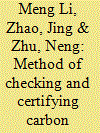| Srl | Item |
| 1 |
ID:
125631


|
|
|
|
|
| Publication |
2013.
|
| Summary/Abstract |
In China, the area of existing buildings in urban and rural has exceeded 43 billion m2 at present and more than 90% of them are high energy consumption buildings, which have poor thermal insulation performance, low energy efficiency technologies and equipments, and severe energy waste in HVAC system. Carbon trading in construction field not only promotes energy efficiency retrofit of existing buildings and energy-saving technologies, but also reduces the financial pressure of government. The most important technical issue is how to estimate the carbon trading volume reasonably. Based on the requirements of energy efficiency retrofit of existing buildings, relevant national or professional standard standards and CDM small scale project methodologies, this paper puts forward a simplified and practical method of checking and certifying the carbon trading volume of existing buildings retrofits in China and calculates four typical cases for trail. Moreover, a comprehensive methodological framework is presented to make the method guide actual cases more directly and apparently. The framework comprises project analysis, scenario determination, data collection and envelope calculation.
|
|
|
|
|
|
|
|
|
|
|
|
|
|
|
|
| 2 |
ID:
122946


|
|
|
|
|
| Publication |
2013.
|
| Summary/Abstract |
Mass migration of rural workers to cities will inevitably increase urban housing demand. However, the scale of vacant urban housing will increase in future as a result of the population aging and the rising number of empty nesters. Therefore, demographic transition may not only increase housing demand, but also increase housing supply. Using an overlapping generations model, the present paper investigates the impact of demographic transition on housing consumption. We find that there is a nonlinear relationship between the elderly dependency ratio and housing consumption in China. With the deepening of population aging, housing consumption will increase; when the elderly dependency ratio reaches a turning point, housing consumption will decrease. The turning point of the nonlinear curve also depends on population mobility. A greater degree of population mobility will result in a delayed turning point. Furthermore, the turning point of the nonlinear curve will emerge when China's elderly dependency ratio reaches a value of 32 percent in 2025. This means that over the next decade, China should continue to increase the level of housing supply.
|
|
|
|
|
|
|
|
|
|
|
|
|
|
|
|